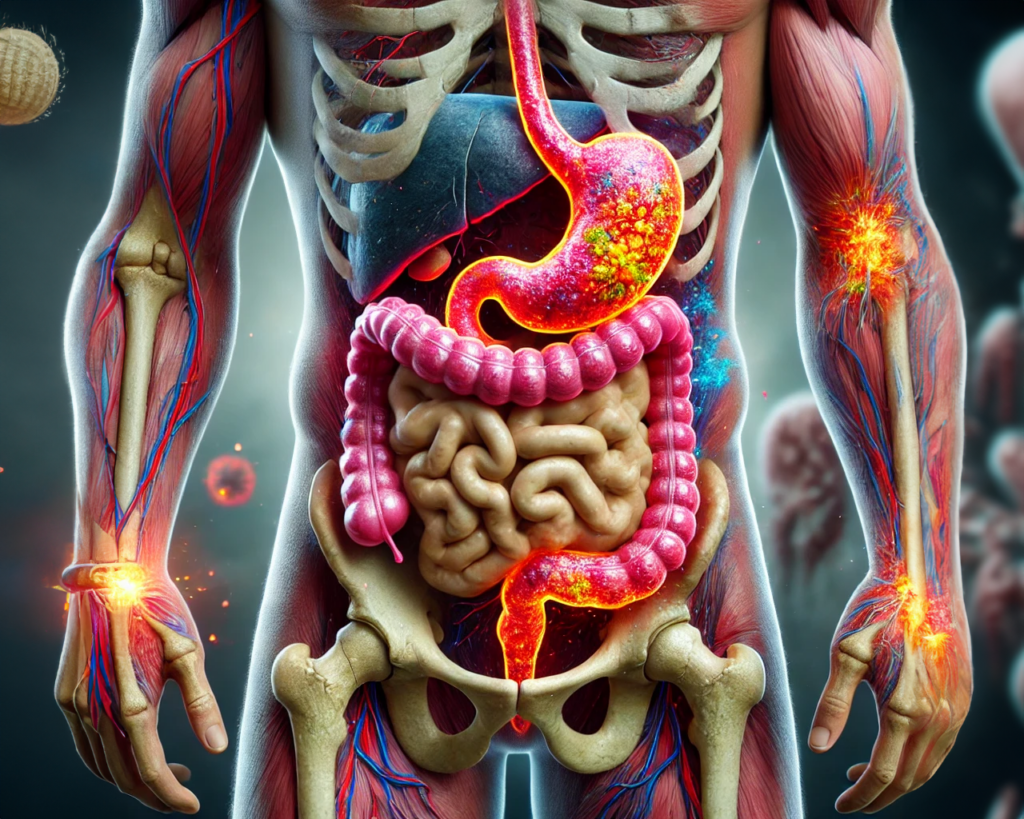Why You Need to Know:
It turns out chronic inflammation is a silent driver of many of the diseases and conditions that affect longevity and quality of life. While acute inflammation is necessary for healing, chronic inflammation can slowly damage tissues, leading to heart disease, diabetes, neurodegeneration, and even cancer. If you’re looking to enhance performance, boost productivity, or extend your lifespan, managing chronic inflammation is key. By understanding its causes and learning to counteract it, you can safeguard your health, prevent disease, and improve recovery, both mentally and physically.
Chronic Inflammation: The Silent Threat
Defined as a long-term, persistent inflammatory response that can last for months or even years. Unlike acute inflammation, which resolves after the body neutralizes a threat, chronic inflammation lingers and continues to damage healthy tissues. This type of inflammation is often subtle, showing no immediate symptoms but wreaking havoc at the cellular level. Causes can include ongoing infections, autoimmune conditions, poor lifestyle habits, or continuous exposure to irritants like pollution and toxins.
At the molecular level, chronic inflammation is driven by the constant release of pro-inflammatory cytokines, including interleukin-6 (IL-6), tumor necrosis factor-alpha (TNF-α), and C-reactive protein (CRP). Over time, these molecules lead to tissue damage, disrupt normal cellular function, and can impair key processes like insulin signaling and cardiovascular regulation.
Causes of Chronic Inflammation:
- Dietary Factors:
Diets high in processed foods, refined carbohydrates, and trans fats are known to trigger low-grade, long-term inflammation. - Obesity:
Excess body fat, especially visceral fat, releases pro-inflammatory cytokines that promote a constant inflammatory state. - Chronic Stress:
Long-term stress elevates cortisol levels, which can lead to immune dysfunction and chronic inflammation. - Infections:
Persistent viral or bacterial infections, like H. pylori or hepatitis C, can sustain a long-term immune response. - Environmental Factors:
Continuous exposure to toxins, pollution, or smoking can trigger and maintain inflammation.
Consequences of Chronic Inflammation:
- Cardiovascular Disease:
Chronic inflammation damages blood vessels, contributing to atherosclerosis (plaque buildup), increasing the risk of heart attacks and strokes. - Type 2 Diabetes:
Inflammation interferes with insulin signaling, leading to insulin resistance and increased blood sugar, eventually contributing to diabetes development. - Neurodegenerative Diseases:
Ongoing inflammation can contribute to Alzheimer’s disease and Parkinson’s disease by damaging neurons and disrupting brain function. - Cancer:
Chronic inflammation promotes DNA damage and can increase the likelihood of mutations, raising the risk of cancers such as colorectal and liver cancer. - Autoimmune Diseases:
When inflammation persists, it can mistakenly target healthy tissues, leading to conditions like rheumatoid arthritis, lupus, and multiple sclerosis.
Action Items:
- Adopt an Anti-Inflammatory Diet:
Prioritize foods rich in antioxidants and omega-3 fatty acids (salmon, flaxseeds, walnuts) while minimizing processed foods and sugars. A study published in the Journal of the American College of Nutrition found that an anti-inflammatory diet can reduce CRP levels by as much as 40% (Galland, 2010). - Exercise Regularly:
Engage in Zone 2 cardio or moderate aerobic exercise at least 3-5 times per week. According to a study in Brain, Behavior, and Immunity, moderate exercise can lower levels of inflammatory markers like IL-6 and CRP (Gleeson et al., 2011). - Manage Stress with Mindfulness:
Chronic stress worsens inflammation, but regular mindfulness practices like meditation and deep breathing have been shown to reduce inflammatory markers by up to 15% (Black et al., 2016). Aim for at least 10-15 minutes of stress management daily. - Prioritize Sleep:
Poor sleep has been linked to elevated CRP levels. A study in PLOS ONE showed that getting at least 7 hours of high-quality sleep per night significantly reduces inflammation (Irwin, 2019). - Supplement Wisely:
Consider adding turmeric (curcumin) or green tea extract (EGCG) to your routine. Research shows that curcumin can lower TNF-α levels, and green tea extract reduces systemic inflammation by modulating immune responses (Aggarwal et al., 2013).
Trivia:
Chronic inflammation contributes to the aging process? The term “inflammaging” describes how inflammation speeds up biological aging, making it a key factor in age-related diseases.



